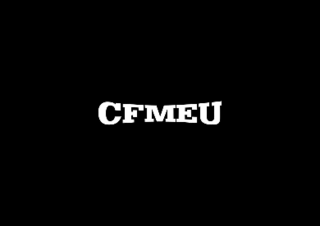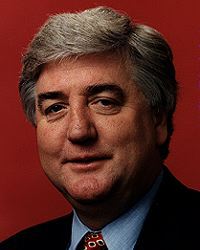
The Transport and General Workers' Union was one of the largest general trade unions in the United Kingdom and Ireland – where it was known as the Amalgamated Transport and General Workers' Union (ATGWU) to differentiate itself from the Irish Transport and General Workers' Union – with 900,000 members. It was founded in 1922 and Ernest Bevin served as its first general secretary.
The Labor Right, also known as Modern Labor or Labor Unity, is a political faction of the Australian Labor Party (ALP) at the national level that is characterised by being more supportive of free markets and more or equally socially conservative than the Labor Left The Labor Right is a broad alliance of various state factions and competes with the Labor Left faction.
George Campbell is an Australian former politician and trade unionist who served as an Australian Labor Party member of the Australian Senate from 1997 to 2008, representing the state of New South Wales.

The Australian Manufacturing Workers Union (AMWU), or more fully the Automotive, Food, Metals, Engineering, Printing and Kindred Industries Union, is an Australian trade union. The AMWU represents a broad range of workers in the manufacturing sector, as well as associated industries, and is affiliated to the Australian Council of Trade Unions.

The United Steel, Paper and Forestry, Rubber, Manufacturing, Energy, Allied Industrial and Service Workers International Union, commonly known as the United Steelworkers (USW), is a general trade union with members across North America. Headquartered in Pittsburgh, the United Steelworkers represents workers in Canada, the Caribbean, and the United States. The United Steelworkers represent workers in a diverse range of industries, including primary and fabricated metals, paper, chemicals, glass, rubber, heavy-duty conveyor belting, tires, transportation, utilities, container industries, pharmaceuticals, call centers, museums, and health care.
The Australian Workers' Union (AWU) is one of Australia's largest and oldest trade unions. It traces its origins to unions founded in the pastoral and mining industries in the late 1880s and it currently has approximately 80,000 members. It has exercised an outsized influence on the Australian Trade Union movement and on the Australian Labor Party throughout its history.

The Construction, Forestry and Maritime Employees Union (CFMEU) is the largest union in construction, forestry, maritime, textile, clothing and footwear production. The CFMEU is affiliated with the Australian Council of Trade Unions and the Australian Labor Party.

United Voice was a Australian trade union from 1992 to 2019. It merged with the National Union of Workers to form the United Workers Union in 2019. United Voice was part of the Labor Left faction of the Australian Labor Party.

Michael George Forshaw is an Australian politician who served as a member of the Australian Senate for the state of New South Wales from May 1994 to June 2011, representing the Australian Labor Party.
The Australian Labor Party Caucus comprises all the elected members of the Australian Labor Party (ALP) in both Houses of the national Parliament. The Caucus determines some matters of policy, parliamentary tactics, and disciplinary measures against disobedient MPs. It is alternatively known as the Federal Parliamentary Labor Party (FPLP).

The Federated Miscellaneous Workers' Union was an Australian trade union from 1915 to 1992. It represented an extremely diverse and disparate range of occupations, but its core support came from workers employed in cleaning and security services. The union merged with the Federated Liquor and Allied Industries Employees' Union of Australia to form United Voice in 1992.
The Australian Labor Party split of 1955 was a split within the Australian Labor Party along ethnocultural lines and about the position towards communism. Key players in the split were the federal opposition leader H. V. "Doc" Evatt and B. A. Santamaria, the dominant force behind the "Catholic Social Studies Movement" or "the Movement".
Manufacturing Grocers' Employees' Federation of Australia (M.G.U.) was an Australian trade union existing between 1906 and 1988. The union was first established as the Federated Candle, Soap, Soda & Starch Employees' Union of Australia, before changing its name in 1914. The union represented workers employed in manufacturing grocers' sundries and non-edible grocery products, particularly in the southern states of South Australia and Victoria. In 1988 the union amalgamated with the Federated Millers and Mill Employees' Union to form the Federated Millers and Manufacturing Grocers Employees' Association of Australia, which in turn merged with a number of unions to form the National Union of Workers.
The Federated Liquor and Allied Industries Employees' Union of Australia (FLAIEU) was an Australian trade union from 1910 to 1992. It represented workers employed in hospitality, catering, breweries and alcohol retailing. The union merged with the Federated Miscellaneous Workers' Union of Australia to form United Voice in 1992.
The Federated Storemen and Packers Union of Australia was an Australian trade union that existed between 1912 and 1988. It represented workers employed in warehousing, transport logistics, and a limited range of manufacturing industries in Australia.
Socialism in Australia dates back at least as far as the late-19th century. Notions of socialism in Australia have taken many different forms including utopian nationalism in the style of Edward Bellamy, the democratic socialist reformist electoral project of the early Australian Labor Party (ALP), and the revolutionary Marxism of parties such as the Communist Party of Australia.

The Federated Ironworkers' Association of Australia (FIA) was an Australian trade union which existed between 1911 and 1991. It represented labourers and semi-skilled workers employed in the steel industry and ironworking, and later also the chemical industry.
The Federated Clerks Union of Australia (FCU) was an Australian trade union representing clerical workers, in existence from 1911 to 1993, when it amalgamated with the Australian Services Union.
The Confectionery Workers' Union of Australia (CWUA) was an Australian trade union which existed between 1925 and 1992. Until 1986, it was known as the Federated Confectioners' Association of Australia (FCA). Throughout its existence, it represented factory workers in the confectionery industry, including a high proportion of women. It was also notable for its involvement in the landmark Dollar Sweets Dispute.

The United Workers Union (UWU) is an Australian trade union. Described as the biggest blue-collar union in Australia, the UWU covers more than 150,000 workers within over 45 industries, including warehousing, defence, hospitality, health, disability support, early childhood education, aged care, logistics and supermarket supply, cleaning, security, farming, manufacturing, and market research. The union is the result of the 2019 merger of two Australian trade unions: United Voice and the National Union of Workers. The United Workers Union is a member of the Labor Left.










